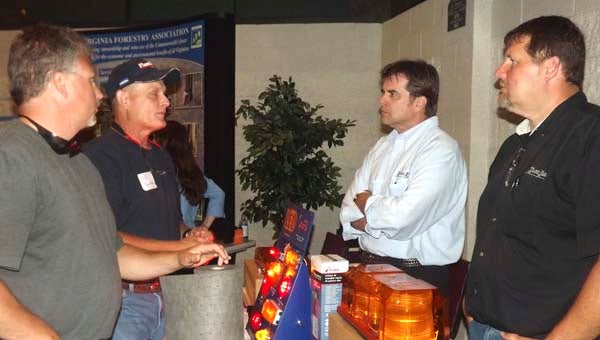Logging expo harvests strong turnout
Published 12:35 pm Wednesday, June 12, 2013

Ralph Jarvis, front left, and Cliff Sexton, both of Blackwater Transport in Virginia, talk with Richard Bracy, front right, and Gurney Burgess, both of Transit Parts from Rich Square, N.C. They were at the Southeast Virginia 2013 Logging Expo, which was held Friday in the Regional Workforce Development Center of Paul D. Camp Community College in Franklin. — Submitted
FRANKLIN—From chainsaws to toothpicks, lumber to tissue, anything having to do with forestry, logging and trees was represented Friday at the inaugural Southeast Virginia 2013 Logging Expo. The seven-hour event was held in the Regional Workforce Development Center at Paul D. Camp Community College in Franklin.

Larry Mitchell of James River Equipment, left, tells a story to Tyler and Ronald Seal, both are loggers in King and Queen County. Ronald said he liked the programs on biofuels and new emerging markets presented at the expo. — Submitted
“We had a good turnout,” said Harrell Turner, adding an attendance estimate ranging from 250 to 300 people.
“The weather probably helped,” he said. “The loggers couldn’t work so they came out to the expo.”
Harrell leads the Southeast Virginia Logging Capacity Task Force. This group was created to review logging capacity issues in the region, and also develop the needed workforce capacity for employer demands.
“We’ll look in July to see what’s the next step,” he said. “Maybe training classes are possible depending on loggers’ needs. We’re also trying to get a connection made between employment agencies and loggers.”
Among the many vendors and presenters was Terri Wallace, a program coordinator for the North Carolina Association of Professional Loggers.
“We train people how to use forestry equipment,” said Wallace, adding the association is connected to the Forestry Equipment Operator Training Program.
She said FOROP gets “students of all ages, from those coming out of high school to those getting out of the military and looking for a new career.”
Next to her table was Tyler Smith, also with NCAPL. He was talking to visitors about discount rates and best programs for members affiliated with the logging industry.
Tyler Seal and Ronald Seal, both loggers in King and Queen County, came down for the event.
“I liked the information on biofuels and new emerging markets,” said Ronald about the day’s program.
“We fully support sustainable managed forests,” Brian Irvine said at the booth for the Virginia Department of Forestry. Based in Courtland, Irvine said among the issues the
department is concerned with includes firefighting and water quality.
“Our department is required by law to ensure that sediment from logging operations doesn’t go into streams,” Irvine cited as one example.
Formerly employed in the logging industry for several years, he’s found the work with the forestry department to be “a natural fit for me.”
Mark Britton of Kapstone from Roanoke Rapids, N.C., was another expo presenter. That company has what he calls a kraft mill. Using 100 percent pine, they make such things as liner board, cardboard boxes and even some grocery sacks, to name a few.





